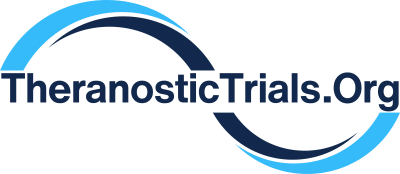Filters
(7 results)
Study Types
Enrolling Status
Study Sponsor Type
NeuroBlastoma
Study Status
Last Updated: Wed Apr 09 2025
Pharmaceutical Trials (Site Sponsors)
🇺🇸

Treatment Undefined Stage
Cu67-Sartate in Pediatric Patients with High-Risk Neuroblastoma
Investigator Trials
Pharmaceutical & Investigator Trials (Non-Site Sponsors)
NCT02914405
Phase I Study of 131-I mIBG Followed by Nivolumab & Dinutuximab Beta Antibodies in Children With Relapsed/Refractory Neuroblastoma
Neuroblastoma, the most common extra-cranial solid tumour in children, remains one of the major challenges in paediatric oncology. A promising way to further improve outcome in this disease appears to be the development of adjuvant therapeutic strategies. In this research the anti-GD2 antibody, which is a standard treatment, is to be combined with 131-l Metaiodobenzylguanidine (mlBG) and anti-Programmed Cell Death Protein 1 (anti-PD1) antibody Nivolumab - the investigated drugs - with the aim of generating sustained anti-neuroblastoma immunity. In particular it will be determined the safety and tolerability of the novel combination as well as documented any evidence of efficacy in paediatric patients with relapsed and refractory high risk neuroblastoma. This study is sponsored by the University Hospital Southampton and will take place in 4 hospitals in the United Kingdom, Germany and USA. The estimated duration of the study is 2 years, starting in December 2016.
🇺🇸
NCT03541720
18F-Fluorodopamine PET Studies of Neuroblastoma and Pheochromocytoma
PET (positron emission tomography) scans combined with a radioactive tracer will be used to identify and analyze tumors. Currently, the most common tracer used to analyze neuroblastoma tumors is called 123I-mIBG. However, the picture it provides is not always clear enough to see the very small areas of the disease.
NCT03561259
A Study of Therapeutic Iobenguane (131-I) and Vorinostat for Recurrent or Progressive High-Risk Neuroblastoma Subjects (OPTIMUM)
The purpose of this study is to evaluate the efficacy and safety of 131I-MIBG in combination with Vorinostat in patients with Recurrent or Progressive neuroblastoma
NCT04559217
Pilot Study of 68Ga-DOTATATE PET/CT and 123I-MIBG Scintigraphy Imaging of Neuroblastoma
Neuroblastoma is the most frequent extracranial childhood tumor, with an annual incidence of approximately 10.2 per million children. Staging of the disease can be done by different imaging strategies (CT, MRI, scintigraphy and PET/CT). Discrepancies may be observed among these different strategies resulting in different treatment strategies. The goal of this study is to assess the feasibility and safety of 68Ga-DOTATATE and to compare it to 123I-MIBG when investigating neuroblastoma.
NCT04724369
Open-Label Study of 18F-mFBG for Imaging Neuroblastoma
This is a Phase 3 study evaluating the positron-emitting radiopharmaceutical 18F-mFBG as an imaging agent for confirming or excluding the presence of neuroblastoma
NCT06233903
A Prospective Study Assessing the Relationship Between Expression of the Norepinephrine Transporter and 18F-mFBG PET Imaging Results in Neuroblastoma Tumor, Other Neural Crest Tumors, and Organs Innervated by the Sympathetic Nervous System
This is a prospective, Phase 2, open-label study designed to assess the relationship of 18F- mFBG PET imaging findings and NET expression in neuroblastoma tumor (Cohort I) and adrenergically-innervated organs in non-tumor subjects or neural crest tumors other than neuroblastoma (e.g. pheochromocytoma/paraganglioma) (Cohort II). As the mechanism of cellular uptake of benzylguanidine compounds such as mFBG is predominantly via cell-surface NET, there should be a demonstrable relationship between level of NET expression, whether expressed on neuroblastoma tumor, other neural crest tumors, or organs innervated by sympathetic neurons, and 18F-mFBG PET results. Eligible participants will either have: histopathologically established diagnosis of neuroblastoma and a scheduled clinical biopsy or surgery procedure within 21 days after 18F-mFBG PET imaging procedure; or be scheduled to have a clinical biopsy or surgery procedure that will yield a tissue specimen from an adrenergically-innervated organ or a non-neuroblastoma neural crest tumor within 21 days after 18F-mFBG PET imaging. At least one tissue specimen must be expected to be suitable for analysis of NET expression. Every subject will be expected to have at least 1 suitable recent tissue specimen available for NET expression analysis. Neuroblastoma subjects will also have undergone at least 1 exam with the current standard of care benzylguanidine imaging agent, 123I-mIBG, during the course of clinical care following the original diagnosis of neuroblastoma. All subjects will undergo 18F-mFBG PET imaging using either clinical PET/CT or PET/MRI equipment. PET studies will be examined on-site by a board-certified nuclear medicine physician or a board-certified radiologist experienced in reading 123I-mIBG and PET scans to ensure technical image quality and information content.

